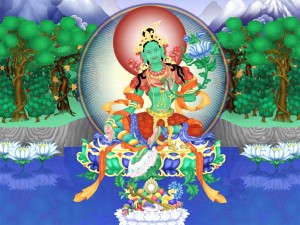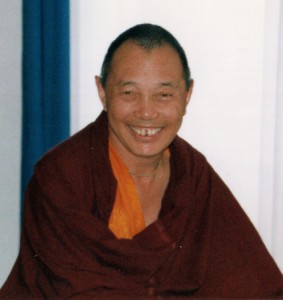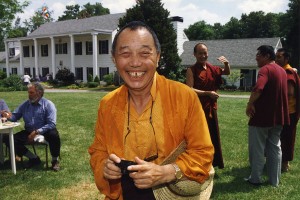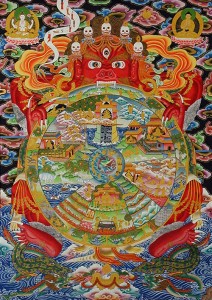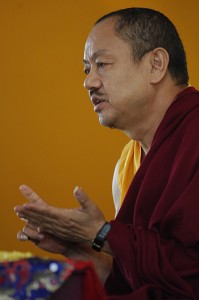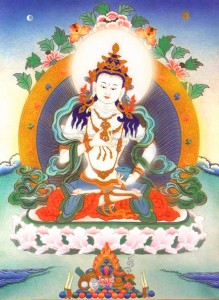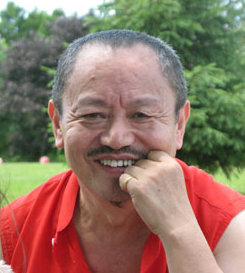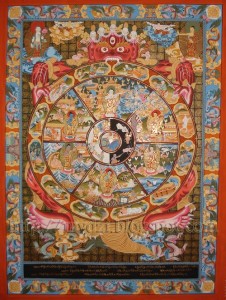Thupten Shedrub Gyatso, who was a Tulku in one of the Palyul Monasteries, wrote this commentary. His present incarnation, Rago Chogtrul currently lives in Tibet.
Translation by Khenpo Tenzin Norgey ~ Spring, 2004,
Palyul Retreat Center, Mc Donough, NY USA ~Wood Monkey Year 2131
Homage to you, who holds your fingers marvelously
In the mudra symbolizing the Triple Gem at your heart.
Swirling masses of light adorn you,
Permeating every direction in beautiful circles.
The ninth praise is homage to Sengdeng Nagi Drolma,Tib the “Tara of the Rosewood Forest” who protects from all kinds of fears. Her color is dark green, with the dazzling radiance of emeralds. Her right hand is in the boon-giving mudra, and the thumb and ring finger of her left hand holds a blue lotus engraved with a wheel. Her remaining fingers are held gracefully upright at her heart in the mudra symbolizing the Triple Gem [i]. The swirling wheel of light, (a metaphor for protection) adorns her like the finest of garments, and it protects like a shield against all torments. Likewise, all beings of the world in ten directions are protected from all kinds of fears by the all-pervasive light that beams from her body, clearing their fears in a display of extraordinary radiance.
The eight kinds of fears are:
1. The fear of elephants represents the power of ignorance. When ignorance grows strong, one ignores the law of cause and effect, indulges in alcohol, (here the use of alcohol is a symbolic of wrong view) and becomes crazy.
2. The fear of iron chains symbolizes habituation to lust and desire that bind together the senses and their objects.
3. The fear of pishaca demons signifies the doubt that steals the life force of nirvana, as it moves in the sky of ignorance, and the doubt that harms the understanding of ultimate meanings.
4. The fear of rivers (floods) is a symbol of desire, acting savagely. By the possession of spirits, the current of desire carries beings towards samsara in its tumultuous waves of birth, sick, aging and death caused by karmic wind.
5. The fear of fire represents the power of anger that burns the forest of virtue. Anger is the cause of anxiety, which in turn causes quarrels, disputes, and partialities.
6. The fear of robbery corresponds to the wrong views that steal the treasure of the supreme goal. This causes one to wander aimlessly in the barren ground of wrong view, (and to) believe in extremes and low ascetic practices.
7. The fear of reptiles represents jealousy, the poison of intolerance of another person’s prosperity. Jealousy results in everything becoming a cause for agitation.
8. The fear of lions. Signifies pride, the conceit of holding high ones own views and conduct. Pride causes one to (metaphorically) develop claws as sharp as a lion’s to belittle others.
These and their casual factors are the eight fears.
Another set of eight fears, which are the fruition of secondary afflictions are:
1. The fear of punishment by kings caused by self-infatuation and harming others.
2. The fear of foes is caused by hypocrisy, gloom, sloth and excitement.
3. The fear of evil spirits is caused by dishonesty and deceit.
4. The fear of leprosy is caused by lack of shame and dread of blame.
5. The fear of being lonely is caused by disbelief.
6. The fear of poverty is caused by stinginess.
7. The fear of thunder is caused by anger and enmity.
8. The fear of failure is caused by indolence and carelessness.
Homage is paid to the lady who protects us from these two sets of fears. The inner meaning is that her wheel of the three primordial wisdom-minds, (the wisdom-minds of emptiness, clarity and compassion, illustrated by the mudra symbolizing the Triple Gem) eliminates the nine bonds and other afflictions, which is a cause for accomplishing the fearless vajra of self-cognized luminosity.
[i] Triple Gem ~ Buddha, Dharma and Sangha. Buddha as the teacher of refuge, the doctrine as actual refuge, and the spiritual community as support for practice.
